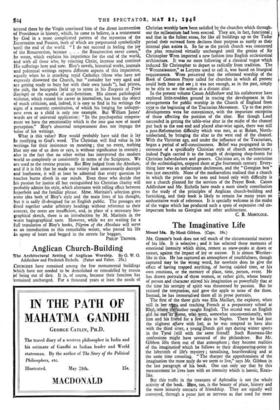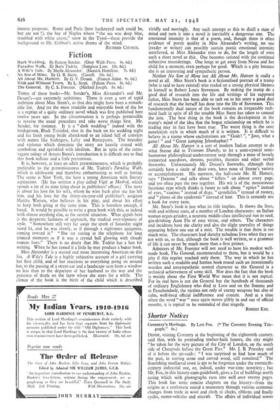The Imaginative Life
Mount Ida. By Monk Gibbon. (Cape. 18s.) MR. Grimort's book does not tell much of the circumstantial matters of his life. It is selective • and it has selected those moments of emotional intensity which shine, remote as snow-peaks at dawn or sunset, against the impact of joy or sorrow. It is almost Werther- like in this. He has captured an atmosphere of youthfulness, though captured may be the wrong word, for nowhere does he give the effect of having trapped anything, of having cajoled time, or his own emotions, or the memory of place, time, person, event. He has drawn portraits of three women, or rather girls, whose beauty of person and character stirred his imagination so powerfully that at the time his serenity of spirit was threatened by passion. But he resisted the temptation, and gave the apple to none of the three. Instead, he has immortalised them all in prose portraits.
The first of the three girls was Ella Maillart, the explorer, when still in her t••• . and teaching French at a preparatory school at
Rhyl, where uthor taught English. The second was an English girl he mei' ome, witti,vent, somewhat unconventionally, with him and his friend for a few days to Naples. There he had just the slightest affaire with her, as he was tempted to have also with the third sitter, a young 'Dutch girl net during winter sports in the Tyrol (still with the same friend)? Such Rousseau-like confessions might have savoured of the philanderer. But Mr. Gibbon lifts them out of that atmosphere ; they become realities of the imaginatior? which he follows to their disappearing-point in the labyrinth of life's mystery ; tantalising, heartbreaking and at the same time consoling. " The sharper the apprehensions of the imagination the more tinily do we seem to live," says Mr. Gibbon in the last paragraph of his book. One can only say that by this measurement he lives here with an intensity which is heroic, Keats- like.
But this traffic in the treasures of Aphrodite is not the whole activity of the book. Here, too, is the beauty of place, history and the more leisurely contacts of friendship. They are equally well conveyed, through a prose just as nervous as that used for more intense purposes. Rome and Paris (how hackneyed such could be, but are not !), the bay of Naples where " the sea was deep blue, troubled with white crests," snow in the Tyrol—these provide the background to Mr. -Gibbon's active drama of the mind.
RICHARD CHURCH.



































 Previous page
Previous page